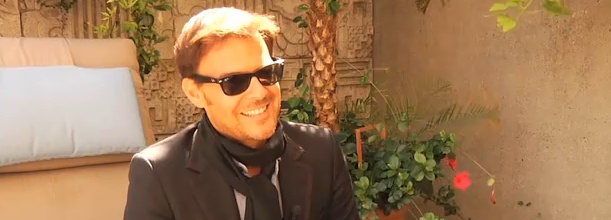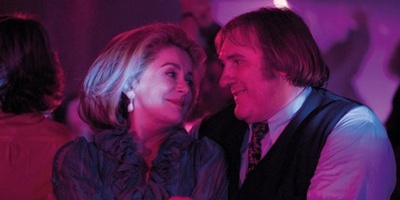Interview! We talk to Potiche director François Ozon

Best For Film’s audience with celebrated director François Ozon didn’t exactly start well – we accidentally walked in during someone else’s slot (easy now) and then managed to stutter, trip over and drop our recording gadget before even getting as far as the chair. Fortunately, this was all by the by. Ozon, whose thick Parisian accent belies his easy familiarity with English (he has filmed in both English and French), was charming and very eager to talk about his charming new film Potiche, the politicised rom-com which once again unites iconic screen couple Catherine Deneuve and Gérard Depardieu.
[FLOWPLAYER=http://uk.image-1.filmtrailer.com/72089.jpg|http://uk.clip-1.filmtrailer.com/5388_22798_a_5.flv,275,180]
This is the fourth time you’ve adapted a play for the screen. What is it that particularly interests you about reworking theatrical pieces for the cinema?
I think that cinema’s origins lie in theatre and it’s important to acknowledge that. When you’re working from something you haven’t written yourself, particularly when it’s something like Potiche or 8 Women [another play which Ozon adapted into a film] that isn’t a masterpiece, you have more freedom to put your own point across – you can really move it around and use whatever you think is good for the film. Very often it’s the pitch that’s good; like with Potiche, where the idea of the woman becoming the boss is the central theme.
Do you find there are any particular challenges associated with working from a playscript rather than an original screenplay or from your own writing?
The challenge is always simply to make a good film. Potiche was different from the other [films Ozon has based on plays], because previously the idea was to keep the theatrical style. 8 Women was the story of women in jail, so the idea was to accept the theatrical origin of the story and its limitations. With Potiche, the story is one of emancipation – it’s a woman who manages to escape from the soi-disant perfect life where she’s not at all happy. The idea was to accept at the beginning of the film that it’s set in a theatrical style, and then to escape and explore through her eyes – [Deneuve’s character] Suzanne visits the factory, she sees [Depardieu’s character] Bebin’s flat. None of these locations existed in the play, but it’s a way to be much more realistic and work on a bigger scale.

Talking of Deneuve and Depardieu’s roles, it must have been extraordinary to work with such an established screen couple. Was there any pressure to continue the tradition of the films they’ve made?
They always play the same roles – she’s the bourgeoise, he’s the worker, their love is impossible. I wanted to tell a new story with this iconic couple, so for me it was a dream to work with them. As a cinephile director. Because we’ve seen them very young in The Last Metro and then seen them ageing film after film through their careers, they’re very important to French audiences – there’s no comparable couple in America except perhaps Katharine Hepburn and Spencer Tracy. It was very helpful for my study of the characters because they’re supposed to be old lovers, but I didn’t have to establish any of that; there’s a magical chemistry between the two of them.
Potiche plays out against a background of industrial action and economic unrest – was it a coincidence that you chose to make it at a time like this?
It’s not a coincidence. I had the film in mind for a long time, but it seemed right to make it when I did because the political context in France now and in the [late] Seventies is so similar, except for the fact that the Parti Communiste is much less powerful now and the feminist movement was only just beginning. In particular, President Sarkozy’s approach of making huge changes whilst staying very conservative is similar to [70s French premier] Valerie Giscard d’Estaing. It seemed like a good way to laugh about today’s situation and show that nothing really changes.

In England, not many people would have the gumption to make a film with such extravagantly dated visuals. What was your motivation there?
I was a child in the Seventies, so I didn’t care about the political climate but I wanted to play with all my cultural memories of that time. We did a lot of research, but if you want to make a film set so recently there’s a lot of material you can draw on. I didn’t want to make the film totally realistic, it’s a little stylised and we focused on tiny details like the velvet telephone cover – my grandmother had one just like it. I wanted to invoke the Seventies spirit in the mise-en-scène but maintain today’s point of view.
Finally, did you have a similar plan for how the slightly self-referential relationship between Deneuve and Depardieu plays out onscreen?
Of course their relationship is deliberately artificial, but I think it works; sometimes you can use these distant moments to tell the truth of the situation. Here we have two actors in their sixties who’re pretending to still be the young actors we remember them as, dancing to the BeeGees in a Seventies nightclub. You see the characters but also the actors behind them, which I think makes it very poignant.
François Ozon, thank you very much.
You can catch Potiche in cinemas from June 17th – whether it’s for a trip down Memory Lane or to introduce yourself to one of the all-time great cinematic partnerships, don’t miss it.





Recent Comments